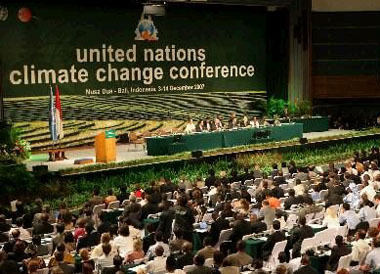Negotiators at climate talks in Bali tried to break a deadlock on Friday over emissions goals after the European Union accused the United States of blocking progress at the 190-nation meeting.
The two-week talks, which are supposed to end on Friday, aim to launch two years of negotiations on an international pact to fight global warming. But the United States, Japan and Canada are opposed to any reference to numerical goals for emissions in the final text.
Ministerial talks ran deep into the night to break the impasse at the UN-led talks involving 10,000 delegates.
"The points of difference of position have become much clearer. We will try to consolidate all the different views in the (next) meeting," said an Indonesian delegate who did not want to be named.
"The numerical target has become the major subject of contention with the same countries holding the same positions," the delegate said.
The EU wants Bali's final text to agree a non-binding goal of cuts in emissions, mainly from burning fossil fuels, of 25 to 40 percent below 1990 levels by 2020 for industrial economies. The United States says any figures would prejudge the outcome.
The United Nations wants the Bali talks to launch formal negotiations on a deal to succeed the Kyoto Protocol by 2009 as the world faces rising seas, more extreme droughts and floods and spread of disease.
Kyoto caps greenhouse gas emissions of all industrial nations except the United States until 2012.
Developing nations are exempt from Kyoto's 2008-2012 first phase and say that before they sign up to any broader agreement, rich countries, particularly the United States as the world's top greenhouse gas emitter, should take the lead in pledging cuts.
Washington submitted a new text to the talks around midnight on Thursday that stressed voluntary goals for greenhouse gases rather than binding Kyoto-style caps for developed countries.
Progress
On other issues, the Bali talks made progress.
Negotiators agreed a deal in principle to share technology -- such as wind turbines or solar panels -- to help poor nations. This week, the talks have also agreed the workings of a fund to help poor nations adapt to climate change and are hoping to take steps to slow deforestation.
The EU threatened on Thursday to pull out of a US meeting of major greenhouse gas emitters next month.
"If we would have a failure in Bali it would be meaningless to have a major economies' meeting" in the United States, Humberto Rosa, Portugal's Secretary of State for Environment, said in Bali. Portugal holds the rotating EU presidency.
Washington, long at odds with many of its Western allies on climate policies, has called a meeting of 17 nations, including China, Russia and India, in Hawaii in late January to discuss long-term curbs on greenhouse gases.
Despite opposition to Kyoto, the United States plans to join a new treaty, meant to be agreed in Copenhagen in late 2009 with participation of developing nations led by China and India.
Former US Vice President Al Gore, fresh from collecting the Nobel Peace Prize in Oslo, won rapturous applause on the sidelines by adding his voice to criticisms of Washington.
"My own country the United States is principally responsible for obstructing progress in Bali," he said.
The United Nations says a Kyoto successor has to be in place in two years to give governments time to ratify the new deal by the end of 2012 and to give markets clear guidelines on how to make investments in clean energy technology.
In a further sign the planet is heating up, the 11 warmest years on record have all occurred in the past 13 years, with 2007 set to be the seventh hottest since 1950, Britain's Met Office and the University of East Anglia said on Thursday.
Another study, to be published in Friday's issue of the journal Science, says that in less than 50 years, oceans might be too acidic for coral reefs to grow because of carbon emissions from the burning of fossil fuels by humans.
(China Daily December 14, 2007)






